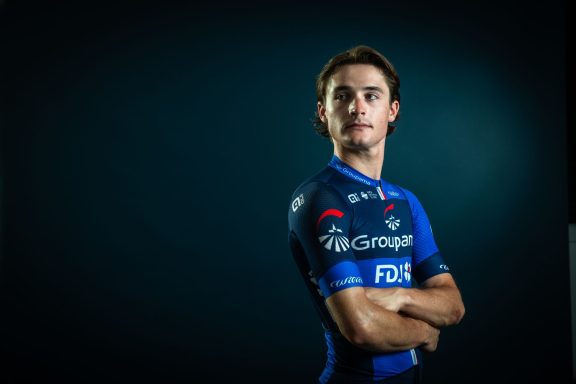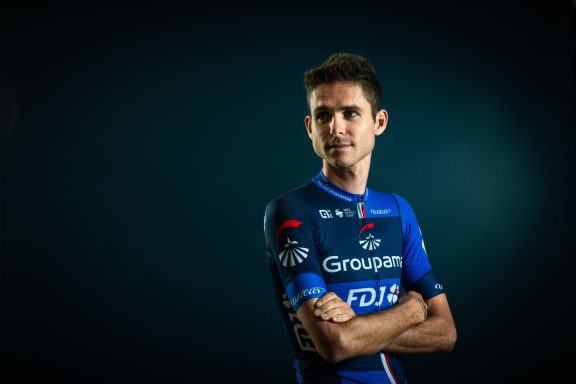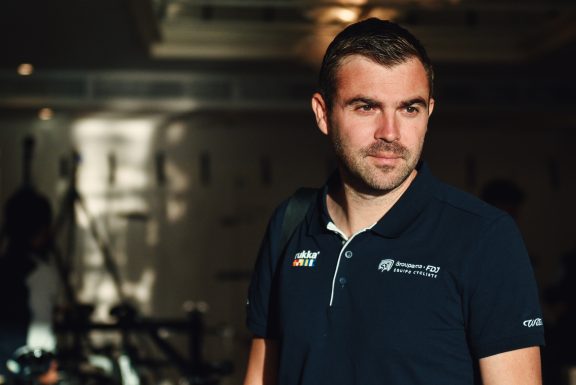Another proof of the Swiss diaspora within the Groupama-FDJ cycling team was brought over the winter. 28-year-old Matteo Badilatti is one of the only two riders recruited outside the organization for the 2021 season. The Swiss climber came across cycling quite late and has, in his own words, experienced “an unusual path” until he reached the WorldTour last year. About to start his fourth year as a pro, Matteo agreed to review his journey in detail but also to discuss his ambitions with his new team.
Matteo, first, I heard you’re attending a training camp.
Exactly. I am now in Mallorca, where we are doing a training camp with the Swiss National team in order to get ready for the next season. Unfortunately, the weather is not that good these days, but we try to make the most of it. Stefan [Küng] and Fabian [Lienhard] are here as well. We’re having a good time and it is a good way to start working together and knowing each other better. The program of this training camp is mainly made of endurance rides, some sprints and we started with some power exercises in the climbs. It’s all about getting the kilometers in the legs. It is going well so far. We arrived on Monday, training started on Tuesday and the camp will last until January 14th. It’s a good 10-day block before heading back home and later joining Groupama-FDJ for the next one.
“I started cycling at the University just to switch off”
With Groupama-FDJ, you will start your fourth season as a pro, at 28. Can you tell us more about your background?
I’ve had quite an unusual cycling path. I grew up in a region with a lot of winter sports and I also come from a family that likes sports. I therefore have quite a sporting background and tried many sports growing up, mostly for fun, as it usually is when you’re young. In different ways, sports were always part of my life. I especially did cross-country skiing but as I entered the University, I knew it would not be possible to continue because of logistics and the area. So, during the University, I started cycling to relax after classes, studying, just to enjoy and to switch off. I really liked it straight away, especially the freedom of it. I discovered a new passion and this passion led me to where I am now. Before that, I was not really familiar with the sport. I would just follow it like any passionate sportsman follows every sport. Sometimes, the Giro would go past really close to my birthplace. Michael Albasini also lived quite close and we could see the pros in the area in the summer, but still I did not know so much about cycling. It was a new world for me.
Did you have any experience of road cycling at all before the University?
I pretty much started from scratch. I remember that one of the family’s friends lent me a road bike for a summer. I really enjoyed riding it in the valley. But that was it. As a kid, you usually do more mountain bike, for fun, or you go to school with your bike. Cycling was always part of my life but I never had in mind to be a cyclist until very late. Also, I was not training too much at the beginning. I was doing less than 10 000 kilometers a year until the very last years. It is only when I got pro with Team Vorarlberg in 2018 that I started to train properly, and with a goal.
How and when did you realize you had capabilities for the sport?
I think it was just a process. You go a little bit further, a little bit faster every time, and then you start doing some small, amateur races. You enjoy it and you note that you’re not suffering that much. You actually see yourself improving, and at the end of the year you look back and you’re like: “Well, I did not think I could do that starting the season”. This way, you continuously make a step forward and then you go on discovering the training, and everything related to the world of cycling, like nutrition, recovery. It’s like a journey where you move from one part to the other while learning something special every single time. Let’s say that you jump into the river, and you like how the water is. I focused on cycling only during the University and after, but I got a little bit better every year.
“I’m still motivated like 20-year-old rider”
Did you know from the start you would be more of a climber?
I would say yes, because even when I was running or mountain biking before, for fun, I always wanted to go up, and to go up fast. Somehow, I enjoyed doing that, and the steepest and longest it got, the more I liked it. It came naturally with cycling. Physically, I’m also kind of made to do that, but the environment you grow up in obviously plays a big role as well. I come from a very mountainous area (he’s born in Poschiavo, editor’s note). The bottom of Mortirolo is not even twenty kilometers away from the house. All around, it’s just ups and downs. In my valley, you can do more than 3000 meters of elevation in less than fifty kilometers! You can get away from them! That’s part of the game.
At what point did you think of making cycling your job?
For me, school and studies always were a priority. It was clear in my mind: « finish the school first, get a background, and then you can do the rest if you enjoy it and have time for it ». I even had some ideas and some dream jobs in the economy sector. I never thought about quitting the studies to focus on cycling. It was more of a process. The more I did cycling, the more I enjoyed it, and the more passionate I was. So when I graduated (a bachelor in Business Administration, editor’s note), I decided to give it a go. I am not sure I would have been able to go pro before. I think this was my path, and everything came right at the right time. Luckily, I had this opportunity to be a pro cyclist, which is a privilege and I’m very honoured about that. All the way, it was just a step-by-step process. It’s obviously important to believe in yourself. Of course, in some races or in training, you notice that you have the potential for it, but it doesn’t mean anything if you don’t put the work behind. I don’t think there was a proper turning point though. In some races, you just show what you can do and people in the business notice you. Also, it’s not all about you. It’s also about the people around you, the family, the people you get to know through the journey. Of course, you’ve got your part to play as an athlete, but all the people around are really important and that is what makes the difference in my opinion.
Do you regret not having focused on cycling earlier?
For sure, you can go pro at 20, but you can also lose motivation at the age of 28 because you did that all your life. I got pro late, but I’m still motivated like a 20-year-old rider. It’s also about the training volume. Some riders that went pro at 20 did big training volumes in their early years, which was not my case. I’m 28 but I’m still young in the business and there is still plenty for me to learn. What surprised me the most at first was the technical part of cycling. If you started cycling as a junior, everything comes naturally. It’s almost automatic. When you start late, you need to learn everything such as riding in the group, in the downhills. It’s not only about the physical side of things, but also about the technical and tactical aspects. It was and still is for me a learning process.
“Everything was still new to me”
You went pro in 2018 and moved up another notch every year since. How do you assess your first three years as a pro?
The first year, I was just so pleased to ride at this level. The environment was good, and when everything is going well, you perform well. I got some results but it was not a proper surprise, more of a nice one. At the end of the day, it was just the work paying off. I also need to thank the Swiss National team for the fantastic job they do for us, Swiss riders, whether we are young or not so much. They take great care of their athletes and give us big opportunities to show ourselves. It also plays a big role. When I joined Israel Cycling Academy in 2019, I was still new to this world and there was still a lot for me to discover, like recovering, saving energy, pacing myself. All that was still new to me and I had to learn it while being at the highest level of the sport, and in a short period of time. For almost all the other riders, riding in the bunch is like a routine. For me, it was not and I needed much more energy compared to the others just to focus on that. I’m still really grateful for the opportunity and for being able to gain this experience and fulfil this gap. Also, before you get to the highest level, you see all these riders on the TV. You sometimes cheer for them. You’re amazed by how strong they are, you would like to be like them. And one day, sooner than you think, you’re there, alongside them. That’s something you need to realize, and I was really respectful to this world when I arrived. When you discover this world, you try to see what you are able to do, what you want to do, and what you can achieve. Then you try to do your best, in every possible way. At the end of the year I could think “it was a good year, I’m really proud” but the most important for me is to say “I’m even more motivated for the next one”. For me, you always need to look forward rather than look behind.
You also had your first experience in a Grand Tour in 2020 with La Vuelta. How was it?
It was a nice experience and it was great to be there. We had Dan Martin as a GC contender in our team, so for me it was a huge learning experience and I’m thankful for the opportunity I got. We had a really good time there. On a personal note, however, I unfortunately got sick in the first week. Then, it was not really a big pleasure to ride anymore but I tried to overcome this and to finish the race. I was not really able to help a lot due to my sickness, as my energy level was really low, but I’m sure this experience will be useful in the future. Some days, when you have a bad time or when you’re ill, it’s important to keep going and keep fighting. You will learn a lot for the next time.
Being still fresh in the sport, do you think that gives you some advantages?
I’m 28 but I think I still have a room for improvement. I started late, so everything comes a bit later. That’s also why I’m so pleased with this opportunity and I’m really proud to be part of Groupama-FDJ. I know they work super well and I believe I will improve a lot here. Obviously, when you get to the top level late, as I did, you might show a bit too much respect at times. You maybe were a fan of some riders before, but now you’re racing against them and you could get too nice, too respectful. Yet sometimes in the race, you need to focus, fight for position and forget about that. It is all about getting this routine. I don’t know if the team got in touch with me because they saw my potential, but I’m sure that they got my motivation. When you are ready to work hard, to give 100% and that you’re always motivated, age does not matter. It’s all about being passionate and loving what you do.
“It was always my dream to be part of this team”
Was joining Groupama-FDJ an easy choice?
It was always my dream to be part of this team and to ride for them. I was really pleased when I got this opportunity. It really was an honour for me and I’m really looking forward to starting racing with them soon. When I first saw the spirit of the team, it was exactly what I expected. It was completely in line with my ideas and my way of thinking. For me, there was absolutely no doubt and it was a no-brainer. Even from the outside, you feel that spirit and that this is a family. You really see that they’re happy to work together, in the same direction, and that everyone is giving their best. It’s a harmonic environment that is working very well. When you see an orchestra playing, you need to think of all the people in the background working hard to make the final outcome excellent. This is what we could imagine from the outside, and this is what it really is.
What was exciting to you with this challenge at Groupama-FDJ?
To be part of this team, to be able to do my work, to achieve the team’s objectives and to give big emotions to our partners and all the people in the background that are working for us. I see myself helping as much as possible in the climbs, and hopefully being able to achieve some great things with the team. I’m a climber, so that’s where the team expects me and where I expect myself too. I want to keep improving as well and to get better step-by-step. I would also be glad to look back at the end of the year being proud of what we achieved together, but most importantly to keep looking forward and being motivated to do even better. I will do the best I can every time. We will see what are the team’s goals and roster for each race, but for sure the stages races with hard routes are the ones that suit me the most.
Final question: How is your French?
It is improving (laughs). The team gave me a fantastic opportunity to take lessons in order to learn the language. I now understand almost everything but speaking with the right pronunciation is still a bit tricky. I can speak, and I have an idea of what I’m saying, but sometimes I’m not quite sure that the others understand what I mean (laughs). To understand is not a big problem for me if they don’t speak too fast, but obviously speaking takes a bit of time and requires more work. However, I’m sure it will be fine. The next interview, we’ll do it in French!



No comment